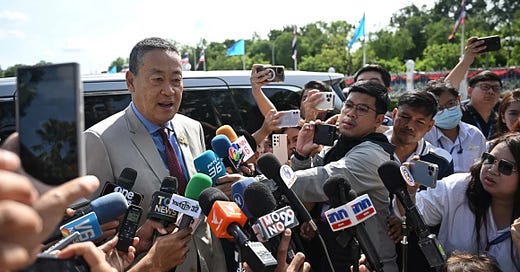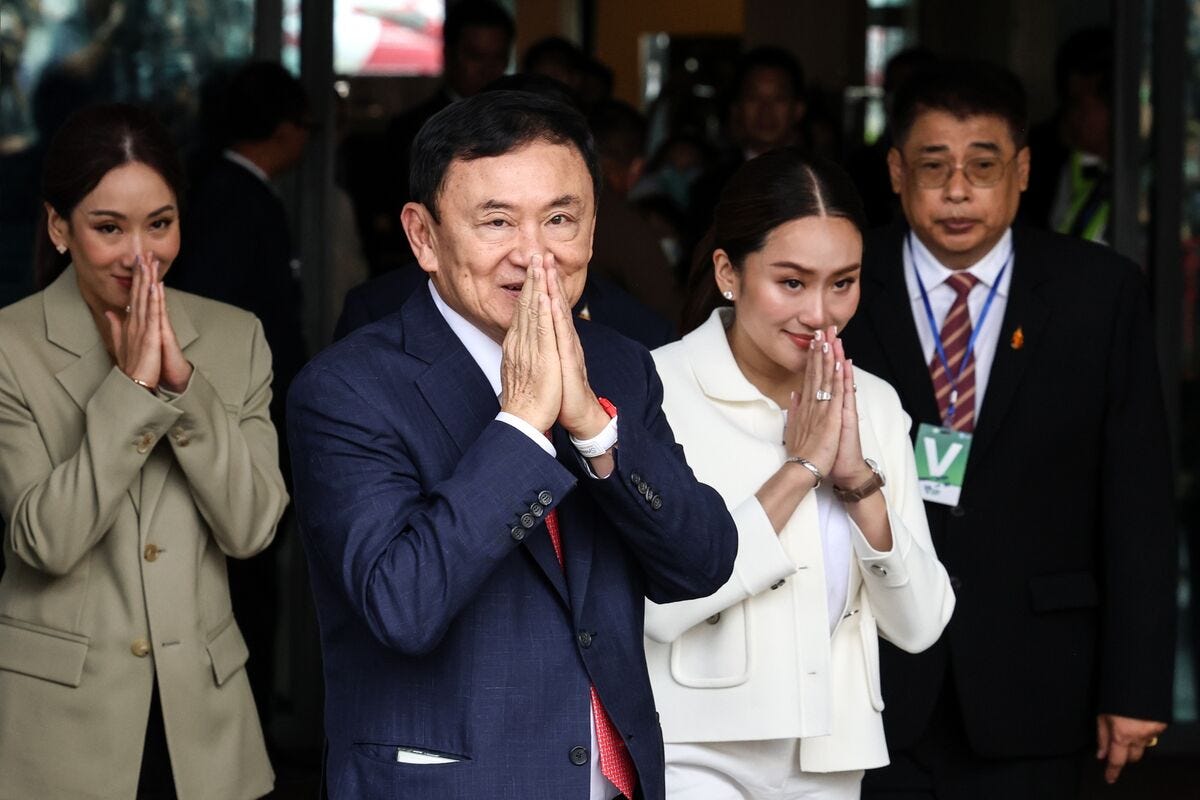Shock Court Decision Ousts Thailand’s Prime Minister
Politics thrown back into confusion, decision looms on lese-majeste for Thaksin
The decision by Thailand’s Constitutional Court to remove Prime Minister Srettha Thavisin, a week after the court dissolved the country’s most popular political party, Move Forward, and banned its leaders from politics for 10 years, is a shock to analysts who assumed that Srettha had carefully navigated the political waters and would escape defenestration, and it pushes the country once again into what is likely to be political paralysis while the economy stagnates.
The court, which ruled on a 5-4 vote, said Srettha had breached ethics rules by appointing Pichit Chuenban, a lawyer with long-running links to the Thaksin family, to the cabinet because Pichit had been caught in a 2008 bribery scandal. Although Pichit resigned immediately to attempt to defuse the situation, the court said the prime minister was “well aware that he appointed a person who seriously lacked moral integrity.”
The decision upends the precarious 11-party government, with the ruling coalition, led by kingmaker Thaksin Shinawatra’s Pheu Thai Party, now having to nominate a new candidate for prime minister, to be voted on by the 500-seat parliament. The verdict means more upheaval, with coalition partners jostling for cabinet positions in a rerun of last year’s political crisis following national elections, when it took more than three months to put the coalition together, with the democratic forces ultimately having to turn to the discredited military parties.
Move Forward, despite its dramatic 2023 election victory based on a popular reform agenda including amendments to the country’s notoriously strict lese majeste laws – which was responsible for its trouble with the constitutional court -- was forced into opposition.
Whether Pheu Thai will be able to keep the premiership in their hands is open to speculation, given the volatile nature of the politics. The junta-written 2017 constitution mandates that parliament can only select from candidates submitted at the 2023 general election, and whose parties won at least 25 seats, an effort to keep the military in power. A temporary clause that allowed for nominations from outside this list has now expired. Parliament is effectively limited to Paethongtharn, Anutin Charnvirakul from Bhumjaithai, Prawit Wongsuwan from the military party Palang Pracharath, and Pirapan Salirathvibagha from the United Thai Nation Party, also a pro-military party founded in 2021 by former prime minister and junta leader Prayuth Chan-ocha.
The decision also raises questions about whether Thaksin himself might be in similar trouble. He had been thought safe from a June indictment on an eight-year-old charge of defaming the country’s monarchy, since he had been allowed to return to the country with permission of the king after 15 years in exile in Dubai. The constitutional court is to decide on his fate on August 19. Thaksin was confident that the indictment didn’t signal another demise, expecting that his release on bail and his earlier royal pardon meant he would easily weather the storm.
But with Srettha’s ouster, apparently fomented by the military and oligarchic diehards, plus the dissolution of Move Forward, which won a plurality of 151 seats in the 2023 elections compared to Pheu Thai’s 141 in the 500-seat parliament, all bets are off. Thaksin has been increasingly active in politics despite his self-characterization as a retired grandfather, which could antagonize the powers behind the court enough to rule against him.
There is also no indication of where the volatile king’s affections lie. Although speculation about his motives and intentions is forbidden and runs the danger of getting long prison terms for those who dare to speculate, he remains a powerful and often-capricious force behind the scenes. He reportedly for years was an implacable foe of the 76-year-old telecommunications billionaire before relenting to allow him to come back to the country last year.
As Asia Sentinel reported on August 13, democratic forces, which had won a resounding majority in the May 2023 elections, have largely been neutralized by the military, the royalty, and the business oligarchy. Srettha, a businessman and real estate tycoon, came into office on a promise to get the country moving again after more than a decade of economic stagnation in which it lost its place as an economic powerhouse among other Southeast Asian nations. It was clear that, as they had in the past, the generals would play for time and let legal and constitutional challenges play out. That has happened.
"Thailand prides itself on the quality of its Olympic boxers, but it was Thailand's unaccountable Constitutional Court, and the conservative elite interests behind it, that really landed a knockout blow by taking down the prime minister,” said Phil Robertson, director of the Asia Human Rights and Labor Advocates consultancy. “This open lawfare on the remaining shreds of Thai democracy will continue as long as the undemocratic 2017 Constitution remains in place. That constitution was drafted by the military to protect the interests of the military and the conservative elites, and it really remains a dark stain on the nation.”
Despite an abbreviated premiership, one of the shortest in recent history, Srettha’s popularity has declined in recent months, polls show, as his key economic policy, a signature Bt500 billion (US$13.8 billion) “digital wallet handout” scheme to give Bt10,000 (US$270) jolt to every Thai pocketbook has been stalled along with other economic stimulus measures and there are concerns that the party has lost its momentum along with its historic connections to its traditional voter base among the vast numbers of poor.
Plans to create jobs and spur spending in underdeveloped regions have also been stymied as Bangkok interests, fearful of a populist surge similar to the 2000s one that made Thaksin the most popular figure in the country and the target of a 2006 coup that drove him from the country, have put on the brakes in the courts and in parliament. Srettha’s plans have yet to be rolled out.
The problem is that Thailand doesn’t have the luxury of waiting around. It is suffering from a paralyzed government while the elites squabble to keep the poor and the young in their place while more and more it depends on its alluring beaches and gleaming palaces and temples to draw ever-increasing numbers of tourists while Malaysia and Vietnam are both benefiting from the supply chain changes wrought by the US-China trade war. Higher spending on infrastructure projects in the subregion’s big economies continues to boost investment demand and growth, according to the Asian Development Bank.
But for Thailand, according to the World Bank, “The growth prospects from the export-led model that not long ago powered so much of Thailand’s economic growth seem to have diminished significantly, owing to stagnation in productivity. Average growth in total factor productivity (TFP) stagnated from a high of 3.6 percent per annum during the early 2000s to just 1.3 percent during 2009–2017. Private investment declined from more than 40 percent in 1997 to 16.9 percent of GDP in 2019, while foreign direct investment flows and participation in global value chains have shown signs of stagnation.”





